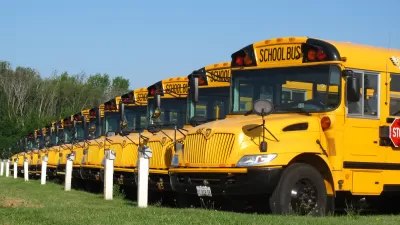Segregated schools are an enduring problem in urban America. But with young affluent (often white) professionals flocking to cities, and enrolling their children in public schools, a historic opportunity exists to create diverse schools.
Emily Badger examines how smart school placement policies could help improve educational outcomes for low-income and minority students in America's cities, and facilitate the integration of entire neighborhoods.
As gentrification sweeps through some urban neighborhoods, "cities and school districts have a narrow window to figure out how to leverage the arrival of affluent families willing to bet on public schools before this newfound diversity in their classrooms disappears," says Badger. "The school districts in Seattle, San Francisco, Louisville, Raleigh, New York City and Boston have all been working on this question lately, rethinking how they assign children to schools and what 'school choice' should mean."
"If school systems could figure out how to create diverse schools amid gentrification, that might also enable what Jennifer Stillman, the author of Gentrification and Schools, calls the missing piece in most gentrifying neighborhoods: 'meaningful social interaction' between a neighborhood's new arrivals and its existing residents. These two groups are likely to go to different restaurants, different churches, even different grocery stores," adds Badger.
"'But schools, to me, are the one place in the community that really are the anchors of the neighborhoods where meaningful social interaction can happen,' Stillman says. Integrate schools, in other words, and that might help better integrate the neighborhoods around them."
FULL STORY: How Diverse Schools Could Help Fight the Worst Effects of Gentrification

Maui's Vacation Rental Debate Turns Ugly
Verbal attacks, misinformation campaigns and fistfights plague a high-stakes debate to convert thousands of vacation rentals into long-term housing.

Planetizen Federal Action Tracker
A weekly monitor of how Trump’s orders and actions are impacting planners and planning in America.

Chicago’s Ghost Rails
Just beneath the surface of the modern city lie the remnants of its expansive early 20th-century streetcar system.

Bend, Oregon Zoning Reforms Prioritize Small-Scale Housing
The city altered its zoning code to allow multi-family housing and eliminated parking mandates citywide.

Amtrak Cutting Jobs, Funding to High-Speed Rail
The agency plans to cut 10 percent of its workforce and has confirmed it will not fund new high-speed rail projects.

LA Denies Basic Services to Unhoused Residents
The city has repeatedly failed to respond to requests for trash pickup at encampment sites, and eliminated a program that provided mobile showers and toilets.
Urban Design for Planners 1: Software Tools
This six-course series explores essential urban design concepts using open source software and equips planners with the tools they need to participate fully in the urban design process.
Planning for Universal Design
Learn the tools for implementing Universal Design in planning regulations.
planning NEXT
Appalachian Highlands Housing Partners
Mpact (founded as Rail~Volution)
City of Camden Redevelopment Agency
City of Astoria
City of Portland
City of Laramie




























